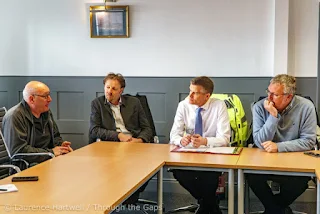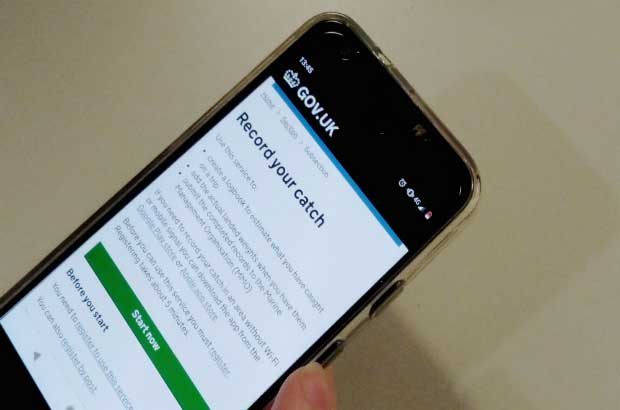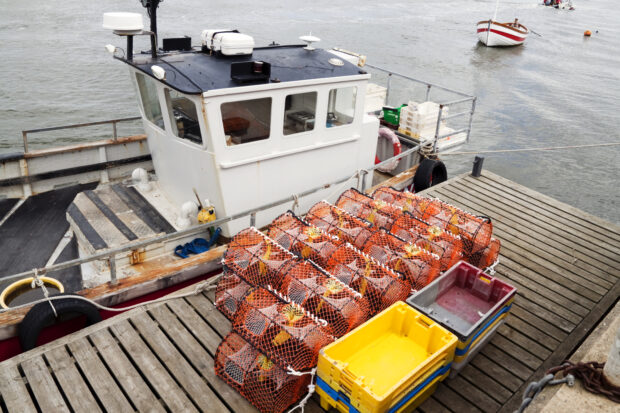Following extensive consultation with the industry, the Government has listened and will waive the requirement for routine medical checks for fishermen on vessels measuring 10 metres and under. While the safety of fishermen remains the top priority, the Government is delivering this pragmatic change so that small-scale fishing businesses aren’t unduly forced ashore and financially burdened by the cost of medical assessments, allowing them to continue fishing without restriction. Small-scale fishing businesses, represent over 80% of UK registered fishing vessels.
Announcing the news this morning, transport secretary Mark Harper along with St Ives MP Derek Thomas and S East Cornwall MP Steve Double, toured the quays talking with with harbourmaster Jonathon Poynter and harbour commissioner Rob Wing before attending a meeting with industry members.
Transport Secretary Mark Harper minister held his hands up and admitted they had got it wrong first time round and that he was hoping to hear approval from the industry during the course of the meeting for the relaxation of the rules.
He said: “This Government backs our fishing industry, which is why we have listened to fishing communities and are easing the burden on small-scale fishermen to make sure they can continue their work unhindered.
“Our fishing sector will be able to continue operating safely, protected by our world leading safety standards, while supporting the UK fishing industry that forms the backbone of so many coastal economies. Vessels of 10 metres and under form a vital part of the UK’s fishing industry, and today we’re taking action to ensure those who work on them will not face the cost of medical assessments."
To that end, handliner Tim Pullen who works a punt from Mousehole, told of his first-hand experience of the current legislation - that of fishing singlehanded without any problems despite having had a heart by-pass years ago - Tim was also keen to seed that, in line with other EU states, that Under10m fishermen should be exempt from medical requirements. With this landmark decision, the government has also widened the eligibility criteria. Initially, during the consultation phase, the government proposed that fishermen on vessels of 10 metres and under must have worked for a minimum of 4 weeks in the year before the regulations took effect. However, recognising the potential for exclusion due to factors such as illness, the government has extended the time limit to 2 years.
Paul
Trebilcok, Chris Rainford and Nathan De Rozarieux, on behalf of fishermen and
industry organisations put their message across, while applauding the MCA and MMO for having listened to the small boat
sector and responding in such a positive way they did, however,
stress the apparent dis-connect between the relevant government
departments and their inability to act in a timely fashion with regard
to enforcing rules and regulations - especially in the case of small
singlehanded boats who can ill afford to be tied up against the quay for
weeks and weeks while the MMO or MCA labour over processing work to be carried out or rules to be complied with.
Chris Ranford
from the CFPO that represents the majority of small boat fishermen in
Cornwall said he was pleased with the result, particularly because the
initial legislation had had such a devastating impact on many
fishermen who thought that their lives were being turned upside down
and in some cases, ruined, for no good reason. He largely supported
the idea that newcomers would be subject to more stringent rules but
happy to hear that grandfather rights were effectively being bestowed
on those who had been at sea for years fishing without any issues
despite their existing and well managed medical conditions. he also stressed the economic and social benefit to the UK of fishing - citing a recent report that showed 15 jobs were supported ashore for every one fishermen at sea.
Earlier, while walking around the harbour with the Mark Harper, local MP Derek Thomas took the opportunity to press the case for supporting major investment in Newlyn. High on the priority list is the development of Sandy Cove for deep-water berthing and services to support an ever-increasing number and size of visiting vessels along with alternative road access - Newlyn saw nearly 30,000 tons of fuel and fish alone transported by road last year through the narrow streets.
Here is a summary of the Medical Exemption
- The consultation proposed an exemption from specific regulations for existing fishers on fishing vessels under 10 metres in length, as per the Merchant Shipping (Work in Fishing Convention) (Medical Certification) Regulations 2018.
- The exemption does not apply to vessels of 24 metres or more in length or to vessels staying at sea for more than three days, as per the Work in Fishing Convention.
- The objective of the exemption is to support existing fishers in the UK fishing industry, reduce regulatory burdens on small businesses, and ensure safety while maintaining continuity in fishing operations.
- Responses from the consultation were categorised to identify key messages and underwent peer review for analysis.
Overall, the report highlights the balance between supporting fishers' needs, industry requirements, and safety considerations within the fishing sector.
An 'M' notice was issued today given the full details of the exemption being introduced.
For any other fishermen needing medical here is a link to a list of GPs across the UK.













